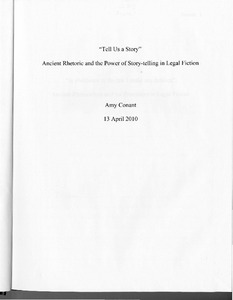| dc.rights.license | In Copyright | en_US |
| dc.creator | Conant, Amy Margaret | |
| dc.date.accessioned | 2023-10-20T15:49:31Z | |
| dc.date.available | 2023-10-20T15:49:31Z | |
| dc.date.created | 2010 | |
| dc.identifier | WLURG038_Conant_thesis_2010 | |
| dc.identifier.uri | https://dspace.wlu.edu/handle/11021/36275 | |
| dc.description.abstract | The power of storytelling in the practice of law is a theme which resonates throughout Twentieth Century American legal fiction. Put simply, it's the idea that "whoever tells the best story wins the case." Storytelling can be a powerfully persuasive tool, prevalent in legal practice as a way to organize complex facts into simple truths. As law has always been my chosen career -- from the all-knowing age of eleven -- I chose to examine the power of storytelling in legal fiction, using four novels centered around four very different lawyers. The analysis goes beyond a simple study of whether lawyers win or lose their cases. In many situations, the study of law goes beyond the typified dramatic courtroom monologs, and thus I expand my study to include a variety of legal fictions. I begin with a standard, modem legal fiction -- John Grisham's bestselling legal thriller The Rainmaker, published in 1995. Many would view this as the typical legal fiction: the story centers around a trial with a lawyer as both the protagonist and narrator. From here, though, I move to a very different type of legal fiction in William Faulkner's Intruder in the Dust (1948), focusing on the power of stories in the pre-trial, discovery
process of the legal system. Next, I examine Harper Lee's To Kill a Mockingbird (1960), which, though focused on a lawyer in the middle of a trial, encapsulates the views of an entire community, thereby emphasizing the legal career as one that exists both inside and outside the courtroom. Lastly, I focus on the rhetorical powers of a lawyer-tumed-politician in Robert Penn Warren's All the King 's Men (1948). [From introductory section] | en_US |
| dc.format.extent | 87 pages | en_US |
| dc.language.iso | en_US | en_US |
| dc.rights | This material is made available for use in research, teaching, and private study, pursuant to U.S. Copyright law. The user assumes full responsibility for any use of the materials, including but not limited to, infringement of copyright and publication rights of reproduced materials. Any materials used should be fully credited with the source. | en_US |
| dc.rights.uri | http://rightsstatements.org/vocab/InC/1.0/ | en_US |
| dc.subject.other | Washington and Lee University -- Honors in English | en_US |
| dc.title | "Tell us a story": Ancient Rhetoric and the Power of Story-Telling in Legal Fiction | en_US |
| dc.type | Text | en_US |
| dcterms.isPartOf | WLURG038 - Student Papers | en_US |
| dc.rights.holder | Conant, Amy Margaret | en_US |
| dc.subject.fast | Legal stories, American | en_US |
| dc.subject.fast | Classical literature -- Influence | en_US |
| dc.subject.fast | Law and literature -- United States | en_US |
| dc.subject.fast | Rhetoric, Ancient | en_US |
| local.department | English | en_US |
